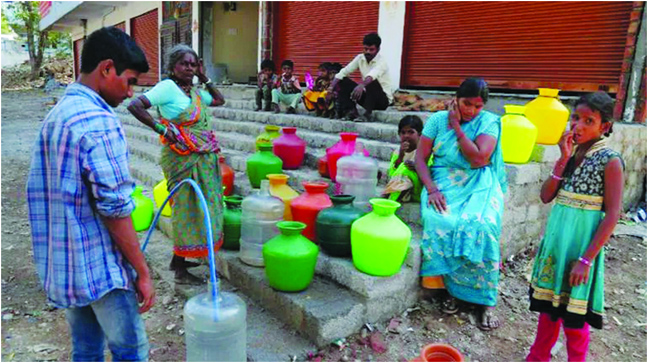
New Delhi (TIP): Access to the “bare necessities” of electricity, water, sanitation and housing (bijli, paani & makan) has improved for citizens across all states in 2018 as compared to 2012, according to the Economic Survey 2020-2021 released Friday, January 29. The improvement has been “disproportionately more” for the poorest households when compared to the richest households across rural and urban areas, it adds in the chapter ‘The Bare Necessities’.
“The improvement in equity is particularly noteworthy because while the rich can seek private alternatives, lobby for better services, or if need be, move to areas where public goods are better provided for, the poor rarely have such choices,” the survey states. While Kerala, Punjab, Haryana and Gujarat are among the states with the highest access to such basic amenities, Odisha, Jharkhand, West Bengal and Tripura have the lowest access, according to the Basic Necessities Index (BNI) created for the purpose of Economic Survey. The BNI examined the progress made in providing these basic necessities at the rural, urban and all India level using data from the 69th and 76th rounds on drinking water, sanitation, hygiene and housing conditions in India. Created for all states for 2012 and 2018, the BNI summarises 26 indicators on five parameters — water, sanitation, housing, micro-environment and other facilities.
The Economic Survey notes that the improvements are widespread as they span each of the five parameters. It adds that inter-state disparities in the access to “the bare necessities” have declined in 2018, when compared to 2012 across rural and urban areas. “This is because the states where the level of access to ‘the bare necessities’ was low in 2012 have gained relatively more between 2012 and 2018,” the report said.
The Economic Survey has highlighted the role played by successive governments to improve access to “the bare necessities” by launching a network of development and welfare schemes.
These include the Swachh Bharat Mission (SBM), National Rural Drinking Water Programme (NRDWP), Pradhan Mantri Awaas Yojana (PMAY), Saubhagya and Ujjwala Yojana among others.
“These schemes were equipped with new features such as use of technology, real-time monitoring, geo-tagging of assets, social audit, embedded digital flow of information, and direct benefit transfers wherever possible,” the survey said. The survey notes that popular Bollywood movies like Roti, Kapda Aur Makaan and the Amitabh Bacchan-starrer Main Azaad Hoon are replete with rhetoric on “the bare necessities”. This is because the idea of accessing the bare necessities of life as a “sine qua non” has resonated with the common man, the survey states. It quotes the song “The bare necessities” from Rudyard Kipling’s The Jungle Book and says it captures their importance too.




Be the first to comment